You have collected the eggs and set them in the incubator, now you are eagerly waiting for 21 days for them to hatch. After waiting the requisite 21 days for chicken eggs to hatch but even after 24 days, it still doesn’t seem to be hatching. Now what? Do I crack it? Do I move them? Do I shake or simply toss them? Why are chickens not hatching after 24 days? Here’s why.
While chicken eggs not hatching is incredibly frustrating experience. And the same is cracking open an egg only to find no chick inside. Fortunately, there are a few reasons why this might happen but not so much on what you can do.
Why Are Chicken Eggs Not Hatching After 24 Days?
If you’ve been eagerly awaiting the arrival of your newly hatched chicks but even after 24 days there’s no sign of life, you may be wondering why your chicken eggs are not hatching. While it’s normal to take hatching 21 days and even up to 23 days (rarely) but if there’s still no hatching happened after 24 days, then the chicken eggs are probably spoiled or dead.
Low or High Temperature
There are a number of factors that can contribute to this issue, but one of the most important is the temperature and humidity levels of the incubator or place where you are hatching eggs. Low or high temperatures can prevent chicks from properly developing and hatching, leaving eggshells intact after 24 days.
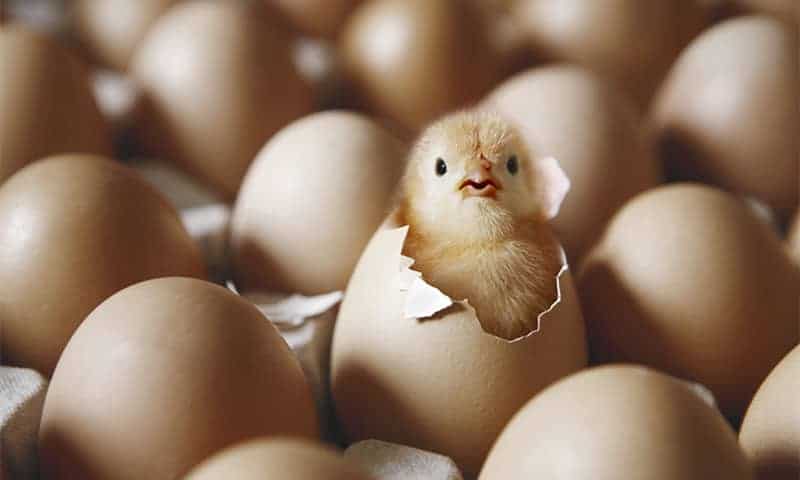
The ideal temperature for chicken hatchlings is between 99 and 102 degrees Fahrenheit. The temperature should be consistent throughout the incubation process to ensure proper development. If the temperature fluctuates too much, it can cause developmental problems or even death. Hatchlings need a warm environment to thrive, so placing them in an incubator is a good option. However, it’s important to make sure that the temperature of the incubator stays within the ideal.
Humidity
Another common reason among people hatching eggs is volatile humidity.
The ideal humidity for the chicken hatch is around 50-60%. This can be measured using a hygrometer. If the humidity is too high, it can cause the chicks to pip (break out of their shells) early and die.
If the humidity is too low, it can cause the shells to dry out and crack, resulting in chick mortality. Maintaining the correct humidity level is essential for a successful chicken hatch. There are several ways to do this, such as using a humidifier or misting the incubator with water. It is also important to keep the eggs turned so that they do not stick to the sides of the incubator.
Other Common Reasons
One of the most frustrating things that can happen to a chicken owner is chicken eggs not hatching after 24 days. There are a number of reasons why chickens may not be successfully hatching their eggs.
Infertility
One reason is infertility. This can be caused by a number of factors, including poor too many or too few males, or if the rooster is too young or too old. However, infertility can be also caused by poor nutrition, stress, and disease.
Infection
One possible cause is an infection, either in the eggs or in the mother hen. Common signs of infection include a reddened or swollen comb and difficulty breathing. In addition to causing failure to hatch, infection can also have negative effects on the health and wellness of both the mother hen and her chicks.
They can also be transmitted from chicken to chicken through the air, so it’s important to keep sick birds away from healthy ones.
Sick Hen
If your hen has a high fever or shows other signs of illness, such as lethargy or hunched posture, she may not be in optimal condition to care for her eggs and brood new chicks. For example, if she is suffering from some form of respiratory infection, you might need to provide her with antibiotics or other medications to support her recovery.
Once she is back on her feet and feeling better, you can start focusing on helping her to successfully hatch and raise her chicks. Whether by providing subsidies like extra food or water sources, you can take care of a sick hen in many different ways. Here’s a good way to take care.
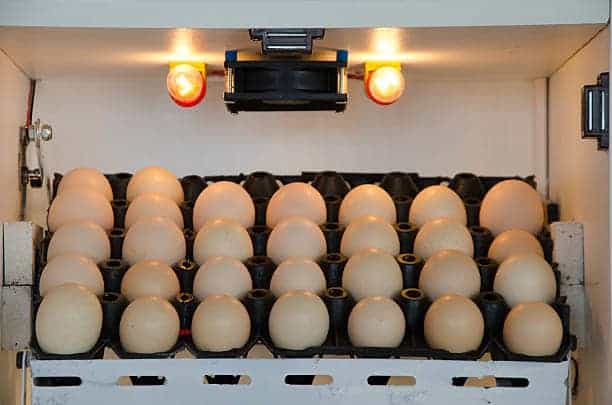
Incorrect Incubator Settings
Incorrect temperature or humidity levels are often to blame, as both of these factors play an essential role not only in hatching, but also in the development of the chick once it has broken free. If the temperature is too low, then it can stunt or kill the embryo, while higher temperatures can cause early death or deformities. Similarly, if the humidity levels are off then it can cause issues with blood circulation and gas exchange between mother and child as well as impacting on how easily the shell breaks for hatching. In order to ensure that your chickens hatch successfully and develop normally, it is therefore important to carefully monitor and adjust your incubator’s settings throughout their gestation period.
Here are the complete signs and solutions to the hatching problem.
What To Do with Chicken Eggs Not Hatching After 24, 21 or 30 Days
If your chicken eggs do not hatch after 24 days and you’re still waiting for it, here are some things you could do.
Check Unhatched Eggs If They Are Alive
Checking eggs to determine whether they are still viable is one of the most important steps in successful hatching.
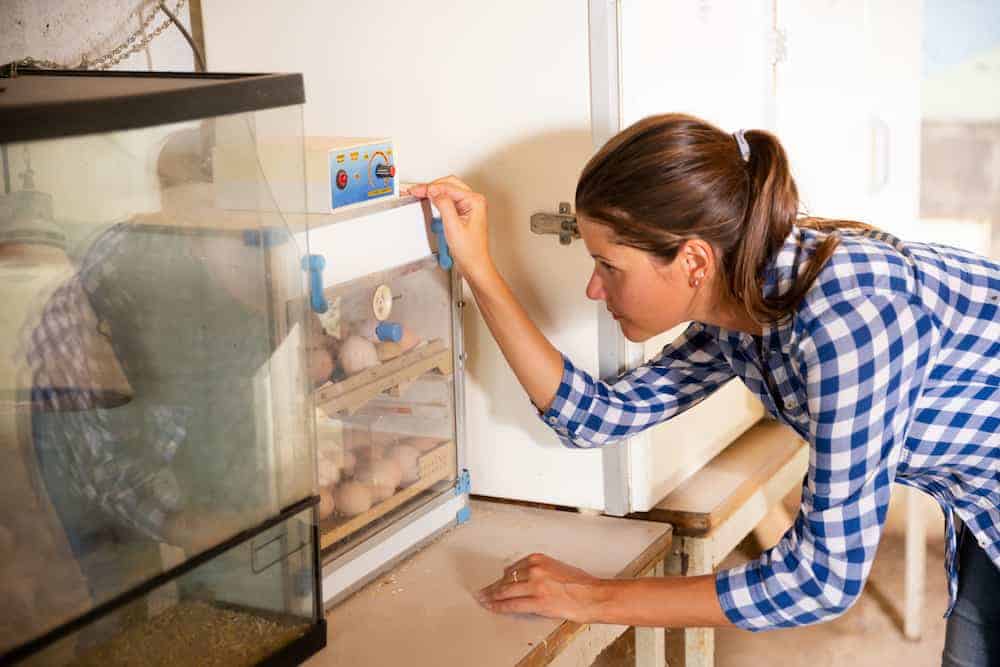
Check With Warm Water Trick
When it comes to hatching eggs, it is essential to know how to check for signs of life. However, there are many ways to check but one of the easy and effective ways is to check with warm water. Simply fill a bowl with warm water and place unhatched eggs one by one in warm water. If the eggs float to the surface or move in the water, then the eggs are alive and healthy and need more time, care and conditions.
If the eggs sinks and doesn’t show any movement, then the eggs might not be alive. You can also check it by candling in the steps below.
Check With Light or Candle
The first step is to candle the eggs, which simply involves holding them up near a light to see if they are developing. Candling may reveal signs like air sacs, clear blood vessels, or a visible embryo depending on the stage of development.
If any of these signs are present, then there is a good chance that the egg is healthy and will hatch. However, candling can also reveal eggs that are dead or infertile. If any of the signs above are present, then chances are the egg is still alive and may take a day or two more for hatching and vice versa if none of the signs are present.mes
All you need is an egg, a bright light, and a dark room. Start by holding the egg up to the light in a darkened room; if the egg is fertile, you should be able to see the shadow of the embryo inside.
If the egg is infertile, it will be completely opaque. You can also check for signs of life by looking for movement within the embryo; if it is still alive, you should see it shifting around inside the egg. Candling eggs is a simple but essential part of successful chicken-keeping. By regularly checking your eggs, you can ensure that your flock is healthy and that each chick has a fighting chance at life.
Check The Egg is Positioned Correctly Inside The Incubator
Positioning the chicken egg is a common mistake people do. However, if chicken eggs aren’t hatching after so long, check if this is a problem.
The eggs should be placed with the larger end facing up and the narrow end facing down. This position helps to keep the embryo centralised in the egg during incubation. Once the eggs are in the tray, close the lid of the incubator and make sure that it is airtight. Then, turn on the incubator and set it to the correct temperature. The incubator will need to be checked regularly to ensure that the temperature remains constant and that the eggs are developing properly.
Check Incubator Settings
Before you begin incubating your eggs, it is important to make sure that the incubator is set up correctly. The temperature and humidity levels need to be just right in order for the eggs to develop properly.
After waiting so long, it’s time to check the incubator settings. Incubators are delicate machines, and even a small change in temperature or humidity can impact the development of the eggs and can make the hatching process longer or maybe even fail.
Pip The Air Sack
determine if an egg is still alive is to pip the air sack. The air sack is located at the large end of the egg and contains a small amount of air that helps to keep the embryo warm. To pip the air sack, simply make a small hole in the shell with a needle and blow gently into the hole. If the air sack expands, then the egg is still alive. However, if the air sack doesn’t expand or deflates quickly, then the egg is probably no longer viable.
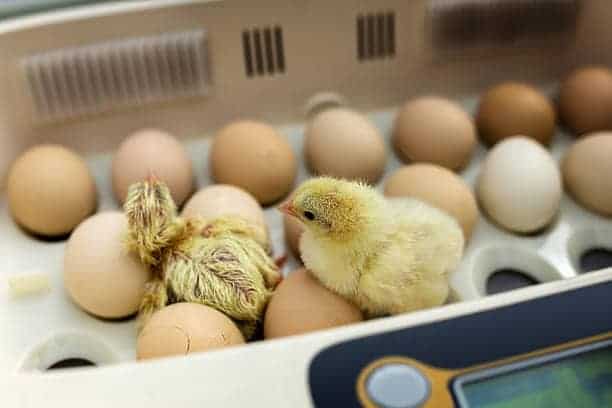
Hatch The Egg Yourself
After checking those, if the chicken’s eggs are showing some or any of those life signs, it’s best to wait for another day or two. After waiting another day or two, if the chicken eggs not hatching after 24 days, then the last thing you should do is hatch the egg yourself.
Hatching the eggs yourself is quite dangerous and can potentially kill the chick. But that should only be done as last resort after you have done the steps above.
Gently start tapping on one end of the shell using a small, hard object such as knife. Now start looking inside and see if the chick has shaped and is alive or not. If the egg is alive and has formed, place it in the incubator and wait for it. Otherwise, simply toss the egg.
While it can be frustrating to lose an egg, remember that nature is not always perfect and not every egg will hatch successfully.
Will Chicken Eggs Hatch After 25 Days?
in general, it takes around 21 days for chicken eggs to hatch after they have been placed in an incubator. This is because chicken eggs typically require about 17 days to go through the first stage of development, after which they need another four days or so before hatching.
However, if the temperature or humidity isn’t ideal, it may take up to 23 days to hatch. But after 25 days, there’s little to no chance chicken eggs will hatch.
Why Are Chicken Eggs Hatching Late? Till How Late Should You Wait?
If your chicken eggs have been incubating for 21 days and they haven’t hatched yet, don’t panic. It’s not unusual for chicken eggs to take a day or two extra days to hatch. There are several reasons why this might happen such as temperature, humidity and infertility. These incorect factors can slow down development and make it difficult for the chicks to hatch on schedule.
If your eggs are taking longer than expected to hatch, simply adjust the humidity and temperature levels in the incubator and be sure to turn the eggs frequently. However, if the eggs should have hatched after 25 days, then most likely the eggs are deceased.
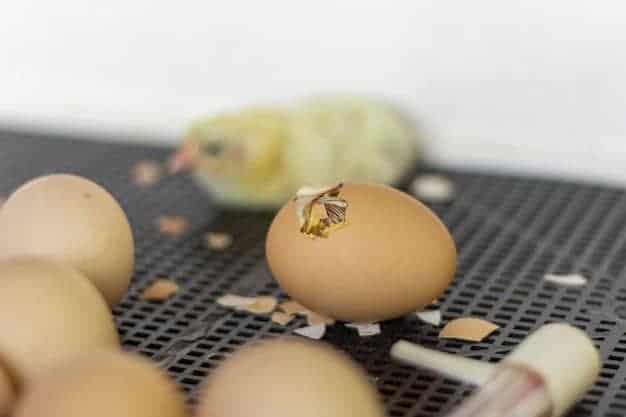
Can Chicken Eggs Take Longer Than 21 Days To Hatch?
While 21 days is the average incubation period, it is normal for chicken eggs to take longer than 21 days to hatch. Although most chicken eggs are hatched by 21 days but sometimes it might take longer than that.
This is not necessarily concerning as long as the temperature and humidity levels are correct. But till long should you wait? In short, chicken eggs can take anywhere from 21 days to 25 days but after 25 days, its less likely that hatch will happen.
How Do You Tell If An Egg Is Not Going To Hatch?
One of the most exciting parts of incubating eggs is waiting to see when they will hatch. Unfortunately, not all eggs are viable, and it can be difficult to tell if an egg is not going to hatch. There are a few key indicators that an egg is not going to hatch.
First, check for cracks or chips in the shell. These damage can prevent the chick from breaking out of the egg.
Second, take a look at the air sac. This is a small cavity at the large end of the egg that helps the chick to breathe. If the air sac is abnormally large or misshapen, it is a sign that the egg has not developed properly.
Finally, candling is a technique where you hold an egg up to a light to check for signs of development. If you can’t see any movement or veins in the embryo, it’s likely that the egg is not going to hatch. While it can be disappointing to find that an egg is not viable, by knowing what to look for, you can save yourself from unnecessary frustration.

How Do You Tell If A Chick Has Died In The Egg? How Do You Test If An Egg Is Alive?
There are a number of different signs that can indicate whether a chick has died in the egg. The first is coloration – you may notice that the egg is discolored or blotchy, a sign that the membrane inside has deteriorated and leaked.
Another common indicator is the development of mold or pitting on the surface of the egg shell, as these conditions can be caused by bacterial growth as well. In some cases, you might also hear strange noises coming from within an egg when you shake it. Ultimately, if you suspect that a chick has died in the egg, it’s best to consult with your vet for further advice and guidance.
With experience and expertise, they will be able to tell you whether or not there is truly a problem, or if everything is progressing normally. So if you’re ever in doubt about whether or not your chicks are thriving, don’t hesitate to speak up – even just asking what’s going on can potentially save them from dying in their shells.
Do Fertile Eggs Sink Or Float?
When it comes to eggs, there are a lot of myths and misconceptions floating around. As a general rule, freshly laid eggs tend to be more dense than older ones and therefore usually sink to the bottom after being placed in a glass of water. However, as an egg ages, it loses moisture through its pores, which reduces its density and causes it to rise to the top.
Can You Hear A Chick Inside An Egg?
At first glance, it may seem like it is impossible to hear a chick inside an egg. After all, the shell of the egg appears to be completely solid and soundproof. However, this is not actually the case. It turns out that a chick can actually produce a small amount of sound while it is still in its egg, and this sound can be detected by anyone with good hearing.
For example, the air sacs inside of a chicken’s body are connected through small holes to the outside of the eggshell, allowing them to produce audible vibrations when they move around or breathe.
On day 20, chicken eggs start breathing for the first time, and it typically starts peeping loudly in excitement as it acclimates to this new environment.
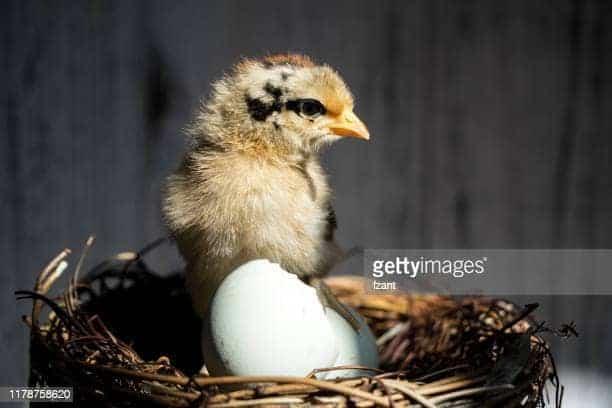
Do Chicken Eggs Move Before Hatching?
As any experienced chicken farmer, a chicken egg can take anywhere from 18 to 21 days to hatch. During this time, the egg will typically remain in the same spot. However, in the days before hatching, the egg may start to move around as the chick inside begins to pip internally and reposition itself. While this can be a normal part of the hatching process, it’s important to keep an eye on your eggs and make sure they’re not being disturbed too much.
So if you notice your eggs starting to move around, just make sure they’re in a safe place where they won’t be jostled too much and let nature take its course.
Is It OK To Help A Chick Out Of Its Shell?
Some people believe that it is never ok to help a chick out of its shell, arguing that forcing the process will only cause stress for the young bird and make it more difficult for it to survive outside of its egg. Others, however, advocate for helping chicks out of their shells, saying that doing so can speed up their maturation and increase their chances of survival in the wild.
After examining the arguments on both sides of this debate, that it is ultimately clear that chicken eggs should naturally hatch without interfere of humans and if everything is going right, the chickens should come out of eggs after 24 hours after it has pipped.
How Can You Tell If A Fertilized Egg Is Rotten?
While fertilized eggs can provide a valuable source of breeding, it is important to be able to identify unhealthy or rotten eggs. One of the key ways to tell if a fertilized egg has gone bad is by smell.
If an egg emits a strong and foul-smelling odor, this may be a sign that it has gone bad. Additionally, you can look for an oozing substance on the surface of the egg or a red blood ring around the yolk. In general, any sign of discoloration or abnormal texture may indicate that an egg has spoiled. That was all about Chicken Eggs Not Hatching After 24 Days.



